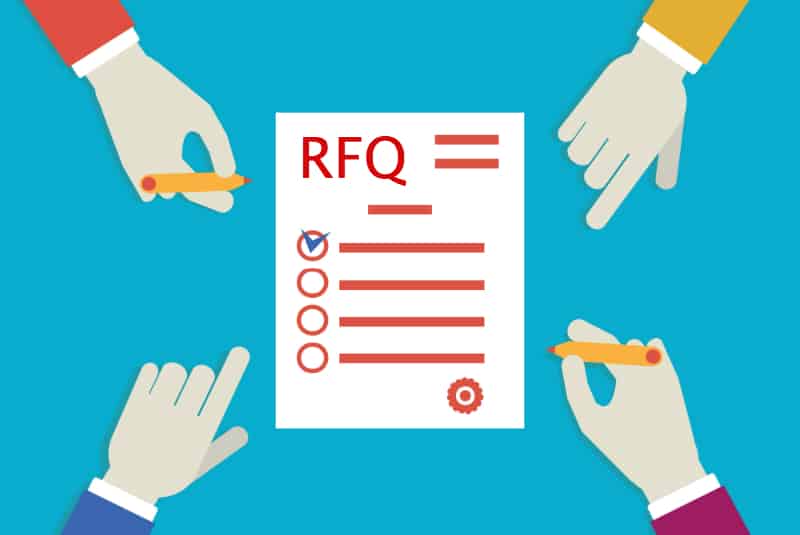Typically, Freight and Transportation Managers dread the thought of gathering all of the tedious information in order to extend an RFQ (Request for Quotation). If it is their first tender document it can seem even more overwhelming than those with previous experience. It is important to remember that putting together an RFQ is an investment for your company so a thorough and accurate examination of previous freight activities is essential.
In the past, there seemed to be a cloak of secrecy when a tender is issued and dialogue between the shipper and carriers was scarce. The good news is that there seems to more of a communicative and collaborative approach when a shipper takes on a carrier that essentially becomes an extension of their own company. After all, the ultimate goal is to establish a partnership with a mutual commitment over a longer term.
Some companies even provide some form of channel during the RFQ time period to answer questions from those who wish to submit a quotation. Documenting this dialogue after awarding the tender may serve to eliminate any potential misunderstandings in the future.
Putting the RFQ Together
The amount of work to compose the tender depends on 3 things.
- Whether or not you have completed a tender in the past.
- The length of time of the previous tender and the duration of the future tender.
- Analyzing all trade lanes, eliminating obsolete ones and adding new ones accumulated over the life of the previous agreement.
Compiling all of the data is easier these days with the myriad of transportation software available. Mining the data is the simple part. Analyzing and recording is a bit harder.
5 Tips for Receiving the Best RFQ Results
- Some of the data contained in an RFQ can be skewed by companies tendering only their major trade lanes. The downside is that while they may receive very competitive rates for the bulk of the business, they are basically allowing the winning bidder full license to charge whatever they like for the remainder of the traffic. Therefore, the savings on the major routes will be diminished by the less common routes.
- The incumbent knows the freight requirements better than any other carrier that is invited to bid. They know the current rates and the costs associated with moving the cargo. New carriers are sometimes inclined to add a ‘fudge factor’ in their bid if they are uncertain of what the total package actually is. Therefore, it is essential that all parties invited to submit a proposal are provided with as much information as possible in order to keep a level playing field. Awarding a bidder with incomplete information will likely cause unnecessary headaches for both parties in the future.
- Accessorial charges vary widely from carrier to carrier in each mode of transport. These charges such as free time, fuel surcharges etc. can represent up to 35% of any company’s overall freight costs. Standardizing these charges in the RFQ for all carriers eases the time and complexity of evaluating offers and once a carrier is nominated, auditing incoming invoices.
- Extend a sufficient amount of time for carriers to respond. Allowing the carriers to analyze the tender document and decipher how it meshes with their freight network does not happen overnight and can produce a weak bid. Three weeks to a month should be ample time for analysis, pricing and submission.
- The number of proposals received will depend on whether you have decided on an open bid or by invitation only. Either way, all proposals must be stringently analyzed for all lanes…not just the major lanes. A common tactic for new carriers is to ‘deep-discount’ the lanes with the highest volume and more than make up for that margin loss with ‘above market’ rates on the less popular lanes.
Careful planning and preparation are the foundation of a successful transportation RFQ. Incomplete tender documents make the issuer’s work doubly hard when considering all of the facets of the quotation that go into making a final decision. Not only can it be a waste of time, but it could also translate to wasteful transportation spending.
Shippers usually only entertain tenders every 2-5 years. For the first one, mistakes are likely to be made and lessons will be learned. For every subsequent RFQ issuance, the process becomes easier and more streamlined based on ongoing dialogue and notations of any anomalies taken over the life of the RFQ. And as a result of that, future bids will be attracted with a full understanding of all requirements needed by both parties.
Finally, it is important to evaluate service levels as well as rates. Ask the bidders for references from their clients that have a resemblance in volume and geographical areas to your freight requirements. Importers and exporters that believe their freight forwarder is an ‘extension’ of their company will likely not benefit from low rates if the service levels are lacking.
Mantoria Inc. provides forwarding services for domestic and trans-border truck freight and international air and ocean routings covering both import and export. Contact us today to talk to one of our logistics and freight specialists!



